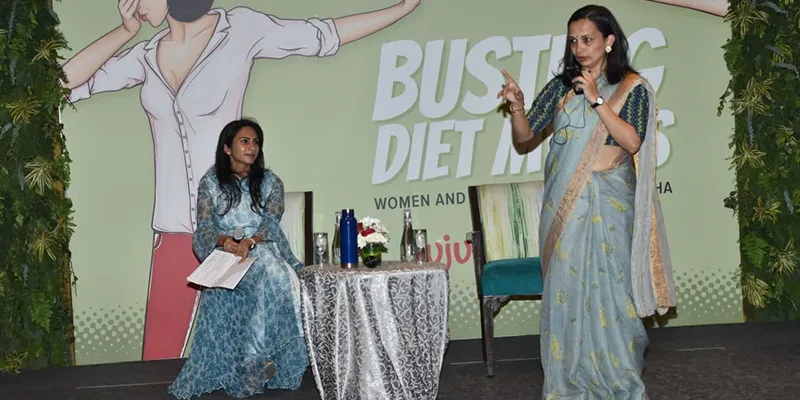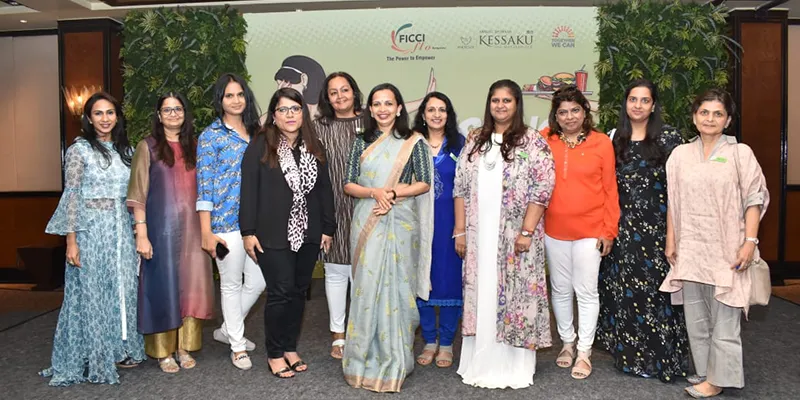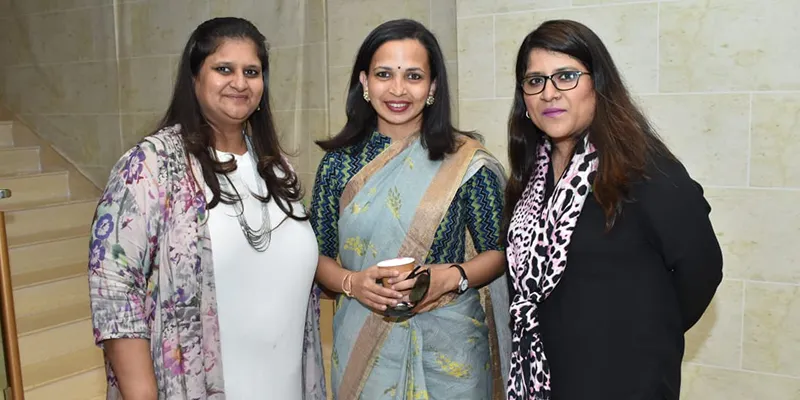‘Enjoy kachoris in Rajasthan and French food in Paris, and not vice versa’: Rujuta Diwekar
Celebrity health and fitness expert Rujuta Diwekar was in Bengaluru recently to talk about diet and fitness and spoke about why people should not weigh themselves daily or count calories continuously
When celebrity health and fitness expert Rujuta Diwekar (who shot to fame some years ago as actress Kareena Kapoor's dietician) stepped on to the podium to take the stage for her presentation on Busting Diet Myths, there was pin-drop silence in the auditorium at Taj Vivanta.
The event, organised by the FICCI Flo chapter in Bangalore, was already a big hit as the hall was packed with attendees who wanted to know more about how to stay healthy and fit in 2020.
Rujuta began with a complex question that had the guests baffled. “What should you never have in your house?” she asked. Everyone had many answers, which ranged from “No microwave” and “No sugar” to many other household objects and condiments.

Rujuta with FICCI Flo member, Divya Goel who introduced the speaker at the event
No weighing machines
The right answer turned out to be “a weighing machine”. Rujuta went on to explain that a weighing machine could neither measure one’s state of health, nor fat or muscle.
“You cannot feel empowered if you are lighter or heavier than yesterday”, she explained. “Some people have weighing machines in every room of the house. We are trained to think that we need to weigh ourselves on three scales and then believe that the scale that shows the heaviest weight is the right one.”
According to Rujuta, it is important to not obsess about numbers. “Fitness is something that empowers you to stand on your own feet and feel the weight of your own thoughts and aspirations. So, feel empowered as a woman.”
Any weighing machine, therefore, needs to be tossed out.
Don’t count calories
The second tip that Rujuta offered was telling the audience not to count calories. Going on a calorie-deficit diet will not make you lose weight. Your entire day will go in counting calories of every morsel you consume instead of enjoying your food.
“It is strange how we want everything big, like big cars and big houses, but our calorie intake must be small,” she observed. “But calorie counting is not necessary.”
She did, however, warn on the need to check consumption and portion-control of food, not the number of calories. "Measure the consumption of your food but respect the food you eat, and give it its due," she said.
Stop classifying foods

The past and present chairpersons and committee members of FICCI Flo with Rujuta Diwekar
The third important tip to keep in mind is not to classify foods.
“Don't divide food into carbs, proteins, and fat,” Rujuta explained. “Some years ago, fat was a bad word, and everyone ate ‘fat-free’ food. But now, the trend is to eat only fats when on a Keto diet,” she said.
Such trends never last because the body is not genetically programmed to receive food in isolation. Food has to be enjoyed in totality, which is why women should not go on protein or fats-only diets.
Think local, eat local
Rujuta believes that we must keep in mind the four factors related to food, namely, crop cycles, cuisine, culture, and climate.

Rujuta Diwekar with Chairperson of Flo, Shruti Mittal and committee member, Nupur Handa
These are the only factors that need to be remembered. “We need to go back to the way we ate traditionally and eat differently every season,” she said.
“Keep in mind farmers who harvest their crops according to the seasons,” she added. “Some rich people give up on native food completely. They don’t eat jackfruit in India because they think it is fattening but when they go to California and find that it is a superfood there, they want to eat it at once.”
It is very important also to eat the local cuisine of the place you are in. “Enjoy your kachoris in Rajasthan and French food in Paris and not vice versa,” she quipped. “If you eat only imported foods, our local farmers will make losses.”
The climate is another factor that needs to be kept in mind. The body needs different foods for different seasons, which is why traditionally bajra is eaten in winter and kokum in summer.
In the question-answer session that followed, there were queries on intermittent fasting, avoiding dairy, and more. It was clear that Rujuta was not a believer in intermittent fasting; she said the body needs energy and needs to be fuelled with food at regular intervals. She did not want people to shun dairy or sugar unless they did not like the tastes of these foods.
As for the digestive system, Rujuta said intermittent fasting was not necessary as the digestive organs did not need a break, but why overwork or underwork anything, she asked. “Instead, you need to help your digestive system work optimally,” she said.
After her talk there was a scramble for autographs and purchases of her latest book, 12-week Fitness Project.
For those keen to learn all about the nuances of diets and diet myths to dispel, it was truly an afternoon well spent.
(Edited by Teja Lele Desai)










